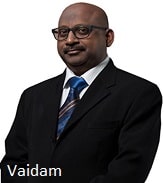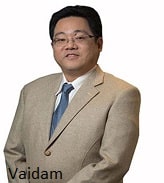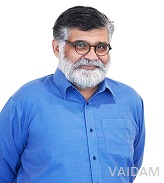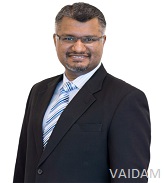Listing approximate price of Cervical Spondylosis Treatment and some related procedures. The prices may change depending upon the centers and condition of the patient.
| Treatment name | Cost range |
|---|---|
| Cervical Spine Surgery | USD 11200 to USD 16800 |
| Anterior Cervical Discectomy | USD 8640 to USD 12960 |
Popular Cities in Malaysia for Cervical Spondylosis Treatment are:
Listing popular specialists:

Consultant, 17 years of experience

Low back pain, Epilepsy, Stroke

Consultant, 19 years of experience

Spine surgery Pain management

Consultant, 15 years of experience

Hip surgery Knee replacement surgery Shoulder surgery Spine surgery

Consultant, 16 years of experience

Neck Injuries and Disorders Spinal Decompression Surgery Lower Back Surgery Spinal Deformity Surgery

Consultant, 18 years of experience

Cervical and Lumbar Spine surgery Neuro –Oncology Traumatic brain Injury Complex Spine surgery

Consultant, 34 years of experience

Spinal Disorders Cervical Spine Disc Disease Fractures & Instability Degenerative Disc Disease Including Disc Bulge

Consultant, 24 years of experience

Slipped disc Lower back pain Spine surgery

Consultant, 25 years of experience

Spine Surgery.

Consultant, 25 years of experience

Spine Surgery.

Consultant, 18 years of experience

Spine related disorders Arthroplasty Orthopaedic surgery.

Consultant, 15 years of experience

Orthopaedic and spine surgery

Consultant, 17 years of experience

Sports Orthopaedic General Orthopedic Orthopaedic Traumatology Paediatric Orthopedic Adult and Pediatric Spine Arthroplasty

Consultant, 20 years of experience

Minimally-invasive spine surgery Discectomy Spinal decompression Transforaminal lumbar interbody fusion Minimally invasive spinal fusion procedures

Consultant, 40 years of experience

Motion-preserving lumbar Cervical spine surgery Minimally invasive spinal decompression and fusion surgery Spinal cord tumours Stem cell therapy in spinal cord injury Complex spinal reconstruction Revision spinal surgery

Consultant, 19 years of experience

Complex spine surgery – Tumour and infection reconstruction – Infection debridement & reconstruction – Adult and paediatric deformities correction Minimally invasive spine and trauma surgery Advanced orthopaedic trauma surgeries Joint replacement

Consultant, 21 years of experience

Spine Surgery
Our Services for Cervical Spondylosis Treatment in Malaysia
Transparent - Professional - Without Hassles
Cervical spondylosis is the condition in which there is age related wear and tear which is affecting the spinal disc in neck. When the spinal disc dehydrates and sinks then the sign or osteoarthritis develops including bony projections along the edges of bone.
With age the bones and the cartilage which makes up the backbone and neck develops wear and tear and these changes result in dehydrated disc, herniated disc, bone spurs and stiff ligaments.
Usually there are no symptoms of cervical spondylosis when symptoms occur they can cause pain and stiffness in neck. Sometimes cervical spondylosis cause narrowing of the space needed by spinal cord such as tingling, numbness and weakness in your arms, hands, legs or feet, lack of coordination and difficulty walking and loss of bladder or bowel control.
Some of the risk factors of cervical spondylosis includes neck injuries, occupation, genetics and smoking.
Cervical spondylosis is usually symptomless. When symptoms do occur, they tend to resolve over time, often without treatment. If symptoms occur, treatment can help to reduce the impact.
Nonsteriodal anti-inflammatory drugs are the best treatment for cervical spondylosis such as cortocosteriods, muscle relaxants and antidepressant.
Cervical spondylosis surgery will take around four to six hours to complete in this surgery the bone from surrounding area and iliac crest are being used.
Cervical spondylosis may need surgery if the conservative treatment fails or some neurological signs and symptoms such as weakness in arms and legs worsen then surgery is needed to create a channel for spinal cord and nerve roots.
Cervical spondylosis is being treated by laminectomy in this procedure the doctor removes the bony arch which forms the backside of spinal canal along with any bony spurs and ligaments which are compressing the spinal cord.
The incision from the surgery will heal within seven to fourteen days, so one to two weeks time is needed to recover from surgery.
The main complication of spondylosis is low back, mid back, or neck pain. Usually the back and neck pain caused by spondylosis is not serious, but some people develop chronic pain due to their condition.
You should avoid doing high intensity exercise and maintain neck muscle strength and mainly the neck extensor strength and avoid holding head in one position for longer time.
You should contact your doctor if you have severe pain, numbness or tingling in arms, muscle weakness, trouble in coordination or walking.






NABH Certified Healthcare Discovery Platform
Vaidam is NABH certified healthcare discovery platform that will connect you to top-notch medical experts, hospitals, wellness options, and trusted travel partners to help identify and make the right healthcare choices.

Researched & Personalized Treatment Plan - Under One Roof
You can search for the best hospitals, read about them, view photographs of the facilities at the hospitals and the places at which the hospitals are located, and check the cost of treatment.

Quality Treatment Within Your Budget
As soon as you post an enquiry, the patient relation team will collect details from you, share them with the doctors and hospitals on Vaidam's panel, and get a personalized treatment plan. We research to get quality treatment within your budget.

Treatment to Travel
Vaidam concierge assists patients, to get medical Visa, the best airline fares and arrangements for your stay. Our concierge also helps you with daily travel, language, and food concerns. Vaidam does everything to be your perfect host. All of Vaidam’s services are free of cost to patients.

International Reach
Vaidam Health has network in 15+ countries, which includes India, Turkey, UAE, Germany, South Korea, Thailand, Malaysia, Spain.
Note: Vaidam Health does not provide medical advice, diagnosis or treatment. The services and information offered on www.vaidam.com are intended solely for informational purposes and cannot replace the professional consultation or treatment by a physician. Vaidam Health discourages copying, cloning of its webpages and its content and it will follow the legal procedures to protect its intellectual property